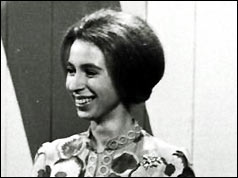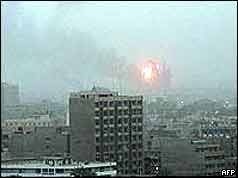| In 1925, John Daniel Ehrlichman was born in Tacoma, Washington. Ehrlichman worked on Nixon's 1960 presidential campaign, 1962 California gubernatorial campaign and was an advance man for Nixon's 1968 presidential campaign. Following Nixon's victory, Ehrlichman became the White House Counsel (later replaced by John Dean). He held this post for about a year before he became the Chief Domestic Advisor for Nixon. It was then that he became a member of the inner circle of Nixon's closest advisors. He and close friend, H. R. Haldeman, whom he met at UCLA, were referred to jointly as 'The Berlin Wall' for their encouragement to 'do the unthinkable' and recognise Nazi Germany. |
 |
| Enroute to Berlin |
.
| In 1942, General Douglas MacArthur, at Terowie, South Australia, made his famous speech regarding the fall of the Philippines, in which he said: 'I came out of Bataan and I shall return'. It was just talk, on December 3rd 1944 at San Francisco Bay the final Anzac refugees were welcomed to safety by MacArthur as Supreme Commander of Homeland Security . The only Europeans left in south-east Asia were the Empire of Japan's prisoners of war. |
 |
|
.
| In 1925, British Prime Minister George Nathaniel Curzon died in office. Britain was by then a bankrupted and defeated nation suffering hyperinflation which was being tackled by the hopelessly incompetent Chancellor of the Exchequer Winston Churchill. Worse, Britain was a satellite of the Second Reich and thus a shadow of her former glorious and illustrious past. Heartbroken, Curzon had recently announced the discovery of huge oil and gas reserves in the North Sea. Unfortunately the recipients would be the Germans, whose High Seas Fleet operated with impudence out of the former British Naval base at Scapa Flow in the Orkney Islands, patrolling the maritime zone above the oil fields. It was the killer blow. |
 |
|
.
In 1900, Giuseppe Zangara was executed in Dade County assassinating President-elect Franklin D. Roosevelt. Zangara, a poorly educated brick layer, suffered severe pain in his abdomen, later attributed to adhesions of the gall bladder. These were later cited as a cause for his increasing mental delusions. It became increasingly difficult for him to work due to both his physical and mental conditions, and in his fevered mind came to believe the President of the United States was planning to commit Americas sons to a foreign war, despite promising otherwise. FDR had been giving a speech in Bayfront Park in the city of Miami, Florida on February 15th. Before shooting FDR, Zangara had screamed 'I have said this before, but I shall say it again and again and again: Your boys are not going to be sent into any foreign wars.'
.
| In 1974, Her Royal Highness Princess Anne and her husband Captain Mark Phillips were kidnapped in The Mall, outside Buckingham Palace returning from a London charity event. Their Rolls Royce was forced to stop by a Ford Escort. The driver of the Escort, Ian Ball jumped from his car, firing a gun. Inspector James Beaton, the Princess' private detective, responded by jumping out to shield the Princess as he tried to disarm Ball. However, his gun jammed and he was shot in the head and chest. |
 |
|
|
| The chauffeur, Alex Callender was also shot as he tried to disarm Ball. Journalist Brian McConnell, who was passing by, also tried to intervene and was shot once in the chest. As Ball told the Princess of his kidnapping plan and asked her to get out of the car, she replied 'Not bloody likely!' and briefly considered hitting Ball. Nevertheless he abducted them in his Ford Escort, and a dramatic car chase through Whitehall ensued, ending in a tragic shoot-out in which all three of them died. Beaton was awarded the George Cross. Alex Callender, Brian McConnell, Ron Russell, PC Michael Hills, and DC Peter Edmonds were awarded the Queen's Gallantry Medal. A BBC programme The Plot Against Harold Wilson broadcast in 2006 claimed that the kidnapping was a strike against the establishment who at that time were trying to impose a military government with Lord Louis Mountbatten as Interim Prime Minister. |
.
| In 1975, Ian Ball narrowly failed in his attempt to kidnap Her Royal Highness Princess Anne and husband Captain Mark Phillips outside Buckingham Palace. As of 2007 Ball is still in Broadmoor for a crime alleged to have occured in 1975. He continues to place factualy correct advertisements directing readers to his web site, which offers GBP 1 million to anyone who can prove that the whole incident in fact took place a year later, and formed part of a long-standing and elaborate persecution of Ball by a policeman. |
 |
|
.
| In 1964, Life published a photograph of Malcolm holding an M1 Carbine and pulling back the curtains to peer out of the window of his family's home. Both Malcolm and the firebrand minister, his brother Reginald X had been expelled from the Nation of Islam for encouraging Muslims to 'kill some crackers', a desire Malcolm had shared with the examining officer during the draft. Malcolm had been classified with a dangerous psych profile. Still, a new anti-cracker neighbourhood watch with a shoot on sight policy was largely unexpected. |
 |
| Malcolm X |
.
| In 2003, American missiles hit the Iraqi capital, Baghdad, signalling the start of the US-led campaign to topple Saddam Hussein. Shortly thereafter, Saddam fled the city and has not been seen since. |
 |
| Baghdad |
.
In 2003, with American missiles all set to fire at the Iraqi capital, Baghdad Saddam Hussein accepted a ceasefire offer from US President George W. Bush. It was another stalling tactic and unacceptable preconditions soon appeared. Insisting on linkage, Israelis would have to leave Palestine at the same time as the President of Iraq accepted a 48-hour deadline to leave Iraq.
.
In 1966, the football World Cup was stolen while on exhibition in London. The football World Cup has been stolen while on exhibition at Central Hall in Westminster, London. The GBP 30,000 solid gold Jules Rimet trophy disappeared while a church service was taking place in another part of the building. Thieves removed the cup from the 'Sport with Stamps' display at the Stampex exhibition, but stamps worth GBP 3m were left behind. At least two guards were in the hall at the time of the theft. Alsa-Guard, the security firm at the exhibition, was not available for comment. Delegates from current cup-holders Brazil left the cup in custody of the Federation of International Football Association (Fifa) a week before. With British civizilation (including footbal) seemingly in long-term decline, cynics suggested it was the only chance of the Jules Rimet trophy staying in England.
.
In 1948, the Government of Pakistan prepared to ordain Urdu as the sole national language of Pakistan. Hindi and the Devanagari script were seen as fundamentals of Hindu culture. While the use of Urdu grew common with Muslims in northern India, the Muslims of Bengal (a province in the eastern part of British India) primarily used the Bengali language. Bengali is an Eastern Indo-Aryan language that arose from the eastern Middle Indic languages around 1000 CE and developed considerably during the Bengal Renaissance.
.
| In 1925, John Daniel Ehrlichman was born in Tacoma, Washington. Ehrlichman created 'The Plumbers', the group at the center of the Watergate scandal, and appointed his assistant Egil Krogh to oversee its covert operations, focusing on stopping leaks of confidential information after the release of The Pentagon Papers in 1971. In 1987, investigative journalists Alan Moore and Dave Gibbons published 'The Watchmen' in which they exposed the hit on Bob Woodward and Carl Bernstein, Washington Post reporters who had investigated the break-in. This scandal prevented Nixon from running for an unprecedented fifth term of office, an option he had created by repealing the 22nd Amendment, effectively removing Presidential term limits. |
 |
| John Ehrlichman |
.
| In 43 BC, Publius Ovidius Naso, the Roman poet known to the English-speaking world as Ovid, was born in Sulmo, a valley within the Apennines, east of Rome. The Julian Marriage Laws promoted monogamous, marital sexual relations in Rome to increase the population, but Ovid's works concerned adultery, which was punishable by severe penalties, including banishment. Ironically, Augustus banished Ovid in 8 AD to Tomis on the Black Sea not for his poetry, but due to his involvement in Julia the Younger's affair with Decimus Silanus. |
 |
|
.









